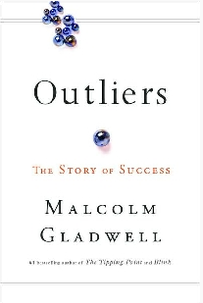
I just finish Malcolm Gladwell’s Outliers: The Story of Success, which I think ranks between his Tipping Point and Blink. It’s really short, so it feels a little light on content. But it’s still a Malcolm Gladwell piece, meaning it has really interesting ideas conveyed with surprising and compelling examples.
Here are the few ideas that struck me, that I can’t wait to drop at my next cocktail party:
- Mitigated Speech: The chapter “The Ethnic Theory of Plane Crashes” describes the central role mitigated speech (the ways in which we soften the meaning of what we’re saying…for example, when your boss says, “We should probably rewrite this report,” it’s mitigated speech meaning, “Rewrite this report, now”) plays in cockpit conversations just before a plane crashes. Gladwell reviews transcripts from black box recordings to show how mitigated speech gets in the way of the clear and direct communication that needs to happen in desperate situations.
- Power Distance Index (PDI): The same chapter continues to describe how mitigated speech can be a function of one’s culturally-inherited notions of authority. Gladwell brings in a study that measured a country’s deference to authority, and then ranked those countries. It turns out, those countries with a high deference to authority, or PDI, (Korea and Colombia) correlate with the amount of plane crashes its pilots have.
- Transmitter vs. Receiver Orientation: The more deferent you are to an authority figure, more that communication between an authority and an underling has a receiver orientation (meaning the onus is on the listener-underling to figure out what the speaker-transmitter is trying to say…which to me explains the impenetrability of French and German philosophy, both countries with high PDI’s). Countries with low PDIs (U.S.), communication has a transmitter orientation, meaning the onus is on the speaker to make himself understood (which explains my own mania about being understood).
The overall story the book tells is about how context and contingency play the determining factors in one’s success. Bill Gates is a success not because his personality guaranteed he would be successful, but because he had certain material advantages and got lucky.
However, in our culture, we personalize success in such a way that we fail to recognize the role context plays. Thus, we have debilitating notions that one’s success has everything to do with the kind of person they are. If one is not destined to be successful, they’re doomed. However, if we give someone the same advantages and surroundings of a successful person, their chances of achieving increases significantly.
This is very much a nurture argument, but not without tipping its hat to nature.